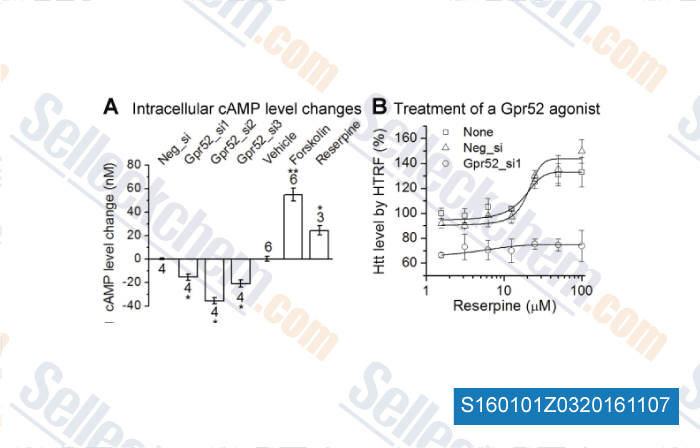|
Toll Free: (877) 796-6397 -- USA and Canada only -- |
Fax: +1-832-582-8590 Orders: +1-832-582-8158 |
Tech Support: +1-832-582-8158 Ext:3 Please provide your Order Number in the email. |
Technical Data
| Formula | C33H40N2O9 |
||||||||||
| Molecular Weight | 608.68 | CAS No. | 50-55-5 | ||||||||
| Solubility (25°C)* | In vitro | DMSO | 20 mg/mL (32.85 mM) | ||||||||
| Water | Insoluble | ||||||||||
| Ethanol | Insoluble | ||||||||||
| In vivo (Add solvents to the product individually and in order) |
|
||||||||||
|
* <1 mg/ml means slightly soluble or insoluble. * Please note that Selleck tests the solubility of all compounds in-house, and the actual solubility may differ slightly from published values. This is normal and is due to slight batch-to-batch variations. * Room temperature shipping (Stability testing shows this product can be shipped without any cooling measures.) |
|||||||||||
Preparing Stock Solutions
Biological Activity
| Description | Reserpine is an inhibitor of multidrug efflux pumps, used as an antipsychotic and antihypertensive drug. Reserpine is an inhibitor of the vesicular monoamine transporter 2 (VMAT2).Reserpine can be used to induce animal models of Gastric and Intestinal Ulcers. |
|---|---|
| In vitro | Reserpine inhibits efflux pumps and reduces sparfloxacin, moxifloxacin and ciprofloxacin IC50s and MICs by up to four-fold in 11, 21 and 48 of the 102 unrelated clinical isolates tested. [1] |
| In vivo | Reserpine (5 mg/kg s.c.) reduces extracellular DA levels to 4% of basal values in intact rats. Reserpine (5 mg/kg s.c.) diminishes L-DOPA (50 mg/kg i.p.)-induced increases in extracellular dopamine levels to 16% of those obtained in denervated animals not pretreated with reserpine in 6-hydroxydopamine-lesioned rats. [2] Reserpine causes a marked depletion of vasopressin/oxytocin-neu-rophysin-like immunoreactivity (LI) and CRH-L1 in the median eminence of the rat. [3] Reserpine significantly restores performance on the delayed response task in monkeys. Reserpine has little effect on performance of a visual discrimination task, a reference memory task which does not depend on the prefrontal cortex. [4] Reserpine injection (one dose of 1 mg/kg s.c.) every other day for 3 days causes a significant increase in vacuous chewing, tongue protrusion and duration of facial twitching in rats, compared to the control. Reserpine results in a decreased glutamate uptake in the subcortical parts of rats. [5] Reserpine (5 mg/kg) significantly increases vacuous jaw movements, and also reduces rearing behavior in all age groups of rats. [6] |
Protocol (from reference)
References
Customer Product Validation

-
, , Elife, 2015, 4:e05449.
Selleck's Reserpine has been cited by 8 publications
| Propafenone facilitates mitochondrial-associated ferroptosis and synergizes with immunotherapy in melanoma [ J Immunother Cancer, 2024, 12(11)e009805] | PubMed: 39581704 |
| JAK2 Inhibitor, Fedratinib, Inhibits P-gp Activity and Co-Treatment Induces Cytotoxicity in Antimitotic Drug-Treated P-gp Overexpressing Resistant KBV20C Cancer Cells [ Int J Mol Sci, 2022, 23(9)4597] | PubMed: 35562984 |
| Terconazole, an Azole Antifungal Drug, Increases Cytotoxicity in Antimitotic Drug-Treated Resistant Cancer Cells with Substrate-Specific P-gp Inhibitory Activity [ Int J Mol Sci, 2022, 23(22)13809] | PubMed: 36430288 |
| Clinical MDR1 inhibitors enhance Smac-mimetic bioavailability to kill murine LSCs and improve survival in AML models [ Blood Adv, 2020, 4(20):5062-5077] | PubMed: 33080008 |
| A striatal-enriched intronic GPCR modulates huntingtin levels and toxicity [Yao Y, et al. Elife, 2015, 10.7554/eLife.05449] | PubMed: 25738228 |
| Dopamine signaling in C. elegans is mediated in part by HLH-17-dependent regulation of extracellular dopamine levels [Felton CM, et al. G3 (Bethesda), 2014, 4(6):1081-9] | PubMed: 24709946 |
| Dopamine signaling in C. elegans is mediated in part by HLH-17-dependent regulation of extracellular dopamine levels [ G3 (Bethesda), 2014, 4(6):1081-9] | PubMed: 24709946 |
| The Olig Family Member HLH-17 Controls Animal Behavior by Modulating Neurotransmitter Signaling in Caenorhabditis elegans. [Felton C, et al. Georgia State University, 2014, Chaquettea Felton] |
RETURN POLICY
Selleck Chemical’s Unconditional Return Policy ensures a smooth online shopping experience for our customers. If you are in any way unsatisfied with your purchase, you may return any item(s) within 7 days of receiving it. In the event of product quality issues, either protocol related or product related problems, you may return any item(s) within 365 days from the original purchase date. Please follow the instructions below when returning products.
SHIPPING AND STORAGE
Selleck products are transported at room temperature. If you receive the product at room temperature, please rest assured, the Selleck Quality Inspection Department has conducted experiments to verify that the normal temperature placement of one month will not affect the biological activity of powder products. After collecting, please store the product according to the requirements described in the datasheet. Most Selleck products are stable under the recommended conditions.
NOT FOR HUMAN, VETERINARY DIAGNOSTIC OR THERAPEUTIC USE.
